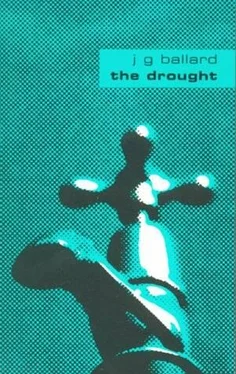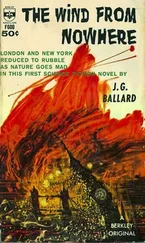Giving up the attempt to pull off his thighboots-like his suit, made from the inner tubes of car ties-Ransom leaned back across the bed. "Judith, I can't. I'm exhausted as it is." Adopting the wheedling tone she herself had used, he went on: "We don't want me to be ill again, do we?" He smiled at her encouragingly, turning his face from the lantern so that she would not see the weal. "Anyway, they won't be going out again tonight. They brought in a huge lake of water."
"They always do." Judith gestured with a febrile hand. She had not yet recovered from Ransom's illness. The task of nursing him and begging for food had been bad enough, but faded into the merest trifle compared with the insecurity of being without the breadwinner for two weeks. "Can't you go out to the sea and fish there? Why do you have to steal water all the time?"
Ransom let this reproof pass. He pressed his frozen hands to the stove. "You can never reach the sea, can't you understand? There's nothing but salt all the way. Anyway, I haven't a net."
"Charles, what's the matter with your face? Who did that?"
For a moment her indignant tone rallied Ransom's spirits, a display of that self-willed temper of old that had driven her from the Johnstone settlement five years earlier. It was this thin thread of independence that Ransom clung to, and he was almost glad of the injury for revealing it.
"We had a brief set-to with them. One of, the paddle blades caught me."
"My God! Whose, I'd like to know? Was it Jordan 's?" When Ransom nodded she said with cold bitterness: "One of these days someone will have his blood."
"He was doing his job."
"Rubbish. He picks on you deliberately." She looked at Ransom critically, and then managed a smile. "Poor Charles."
Pulling his boots down to his ankles, Ransom crossed the hearth and sat down beside her, feeling the pale warmth inside her shawl. Her brittle fingers kneaded his shoulders and then brushed his graying hair from his forehead. Huddled beside her inside the blanket, one hand resting limply on her thin thighs, Ransom gazed around the drab interior of the shack. The decline in his life in the five years since Judith had come to live with him needed no underlining, but he realized that this was part of the continuous decline of all the beach settlements. It was true that he now had the task of feeding them both, and that Judith made little contribution to their survival, but she did at least guard their meager fish and water stocks while he was away. Raids on the isolated outcasts had now become more frequent.
However, it was not this that held them together, but their awareness that only with each other could they keep alive some faint shadow of their former personalities, whatever their defects, and arrest the gradual numbing of sense and identity that was the unseen gradient of the dune limbo. Like all purgatories, the beach was a waiting ground, the endless stretches of wet salt sucking away from them all but the hardest core of themselves. These tiny nodes of identity glimmered faintly in the gray light of the limbo, as this zone of nothingness waited for them to dissolve and deliquesce like the few crystals dried by the sun. During the first years, when Judith had lived with Hendry in the settlement, Ransom had noticed her becoming increasingly shrewish and sharptongued, and assumed this to mark the break-up of her personality. Later, when Hendry became Johnstone's righthand man, his association with Judith was a handicap. Her bodkin tongue and unpredictable ways made her intolerable to Johnstone's daughters and the other womenfolk.
She left the settlement of her own accord. After living precariously in the old shacks among the salt tips, she one day knocked on the door of Ransom's cabin. It was then that Ransom realized that Judith was one of the few people on the beach to have survived intact. The cold and brine had merely cut away the soft tissues Of convention and politeness. However bad-tempered and impatient, she was still herself.
Yet this stopping of the clock had gained them nothing. The beach was a zone without time, suspended in an endless interval as flaccid and enduring as the wet dunes themselves. Often Ransom remembered the painting by Tanguy that he had once treasured. Its drained beaches, eroded of all associations, of all sense of time, in some ways seemed a photographic portrait of the salt world of the shore. But the similarity was misleading. On the beach, time was not absent but immobilized, what was new in their lives and relationships they could form only from the residues of the past, from the failures and omissions that persisted into the present like the wreckage and scrap metal from which they built their cabins.
Ransom looked down at Judith as she gazed blankly into the stove. Despite the five years together, the five arctic winters and fierce summers when the salt banks gleamed like causeways of chalk, he felt few bonds between them. The success, if such a term could be used, of their present union, like its previous failure, had been decided by wholly impersonal considerations, above all by the zone of time in which they found themselves.
He stood up. "I'll bring one of the fish down. We'll have some breakfast."
"Can we spare it?"
"No. But perhaps there'll be a tidal wave tonight."
Once every three or four years, in response to some distant submarine earthquake, a huge wave would inundate the coast. The third and last of these, some two years earlier, had swept across the saltflats an hour before dawn, reaching to the very margins of the beach. The hundreds of shacks and dwellings among the dunes had been destroyed by the waist-high water, the reservoir pools washed away in a few seconds. Staggering about in the sliding salt, they had watched everything they owned carried away. As the luminous water swilled around the wrecked ships, the exhausted beachdwellers had climbed up onto the salt tips and sat there until dawn.
Then, in the first light, they had seen a fabulous spectacle. The entire stretch of the draining saltflats was covered with the expiring forms of tens of thousands of stranded fish, every pool alive with crabs and shrimps. The ensuing bloodfeast, as the gulls dived and screamed around the flashing spears, had rekindled the remaining survivors. For three weeks, led by the Reverend Johnstone, they had moved from pool to pool, and gorged themselves like beasts performing an obscene eucharist.
However, as Ransom walked over to the fish tank he was thinking, not of this, but of the first great wave, some six months after their arrival. Then the tide had gathered for them a harvest of corpses. The thousands of bodies they had tipped into the sea after the final bloody battles on the beaches had come back to them, their drowned eyes and blanched faces staring from the shallow pools. The washed wounds, cleansed of all blood and hate, haunted them in their dreams. Working at night, they buried the bodies in deep pits below the first salt tips. Sometimes Ransom would wake and go out into the darkness, half-expecting the washed bones to sprout through the salt below his feet.
Recently Ransom's memories of the corpses, repressed for so many years, had come back to him with added force. As he picked up his paddle and flicked one of the herrings onto the sand, he reflected that perhaps his reluctance to join the settlement stemmed from his identification of the fish with the bodies of the dead. However bitter his memories of the halfwilling part he had played in the massacres, he now accepted that he would have to leave the solitary shack and join the Reverend Johnstone's small feudal world. At least the institutional relics and taboos would allay his memories in a way that he alone could not.
To Judith, as the fish browned in the frying pan, he said: "Grady is going to join the settlement."
Читать дальше
Конец ознакомительного отрывка
Купить книгу








